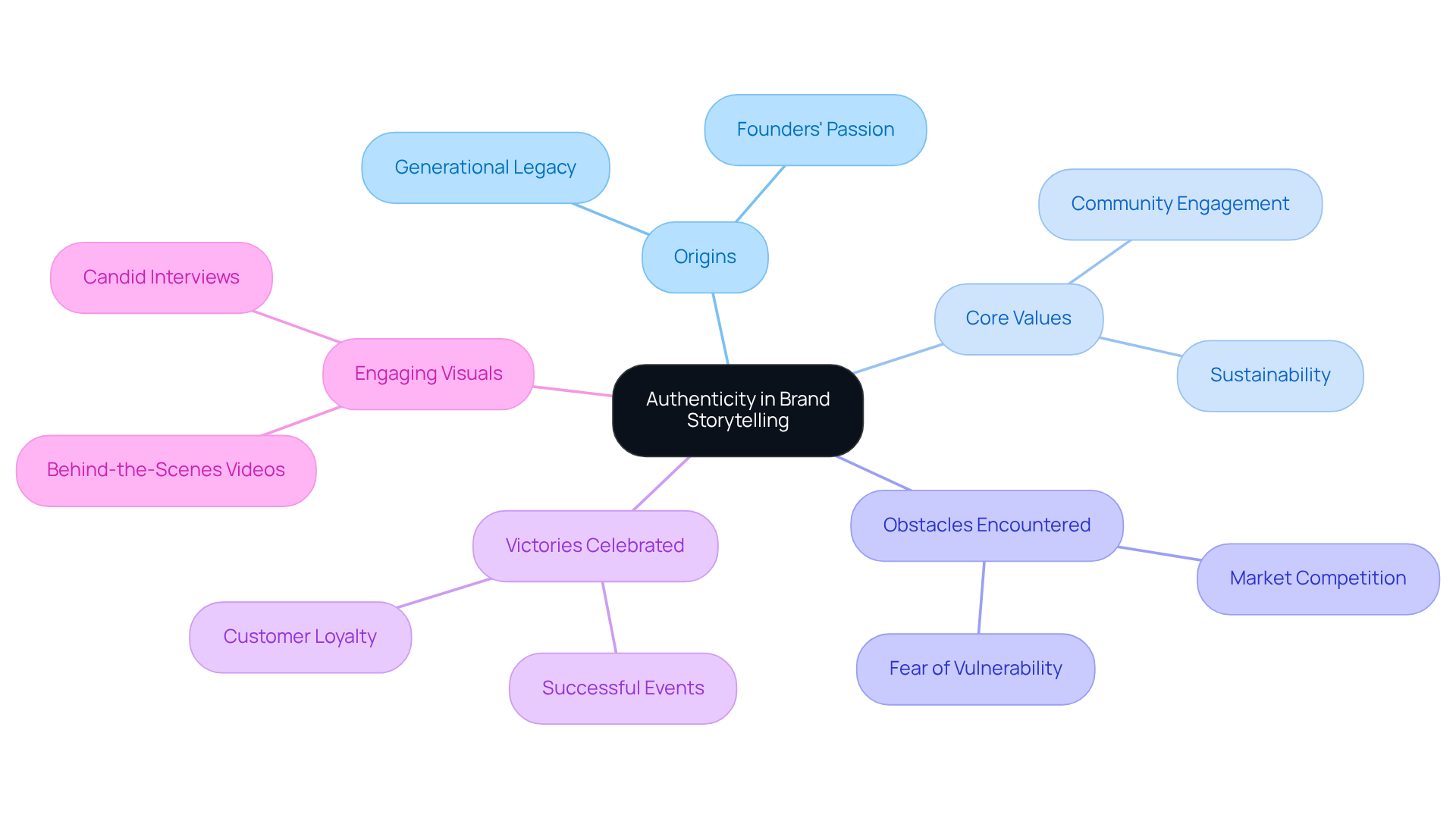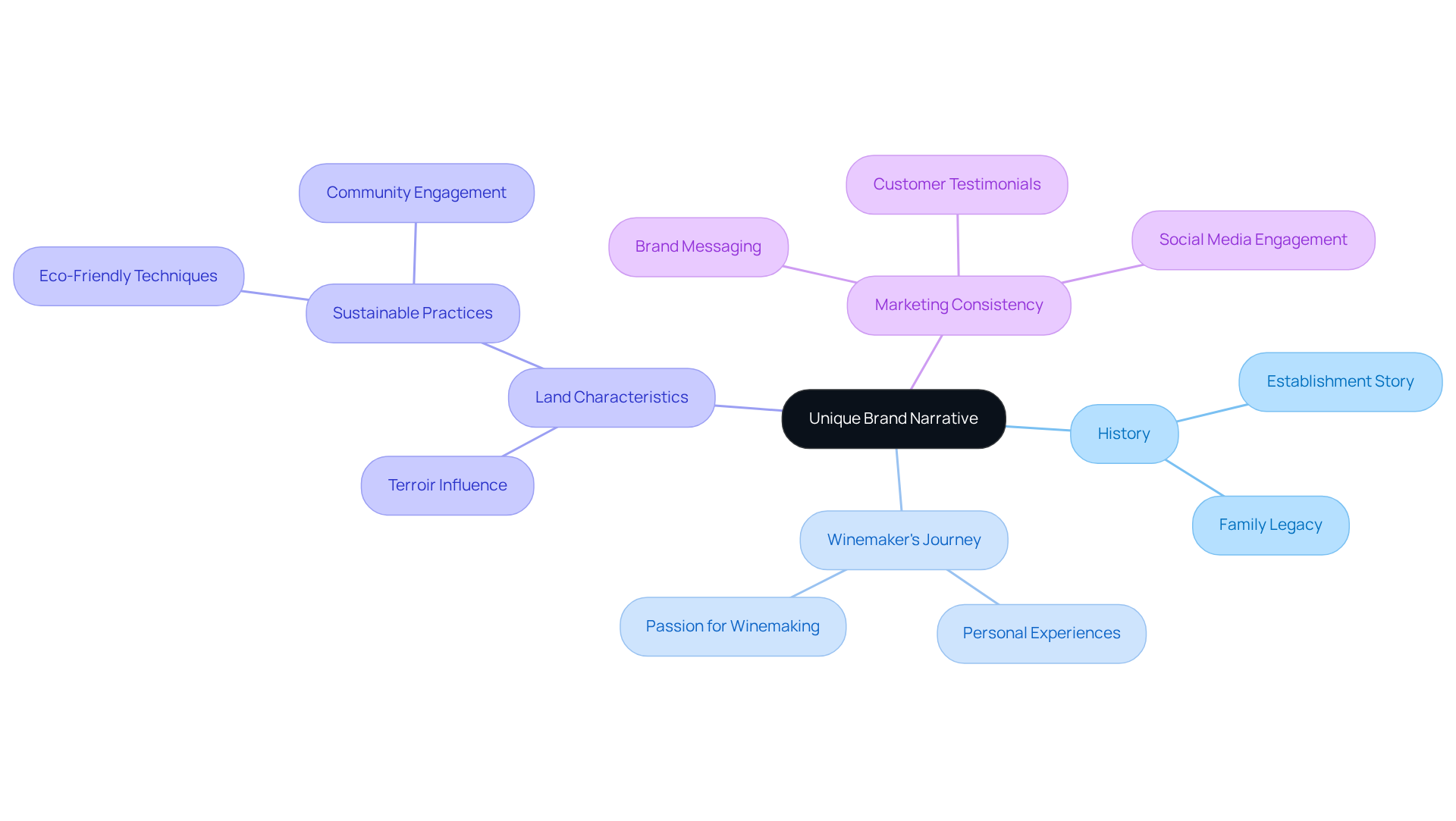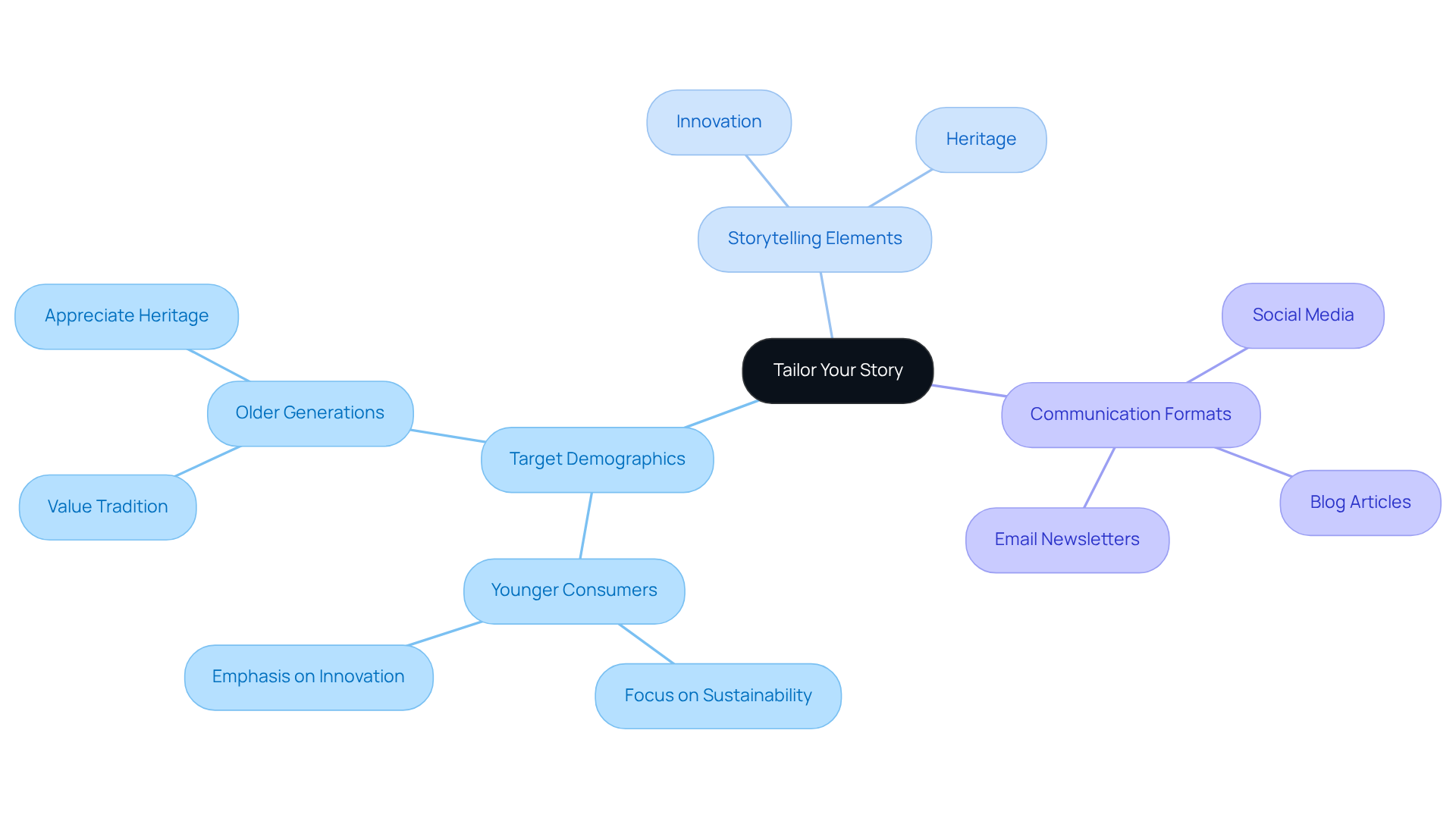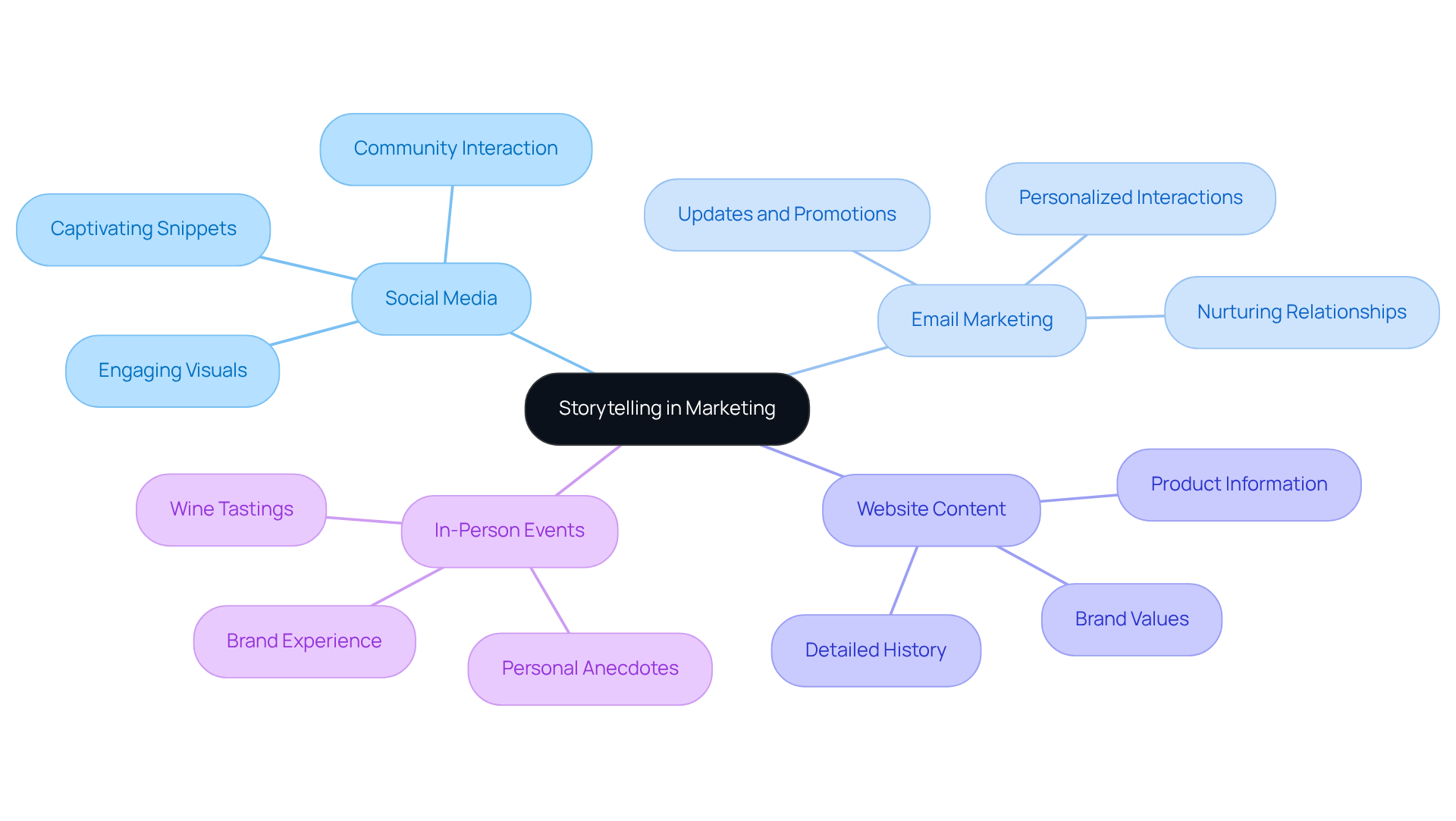Overview
Effective brand storytelling for winemakers hinges on several best practices:
- Embracing authenticity
- Articulating a unique brand narrative
- Tailoring stories to engage target audiences
- Integrating storytelling across marketing channels
Authentic narratives not only foster trust and loyalty but also enhance customer engagement and drive sales growth. This underscores the vital role of storytelling in cultivating enduring relationships with consumers. By adopting these strategies, winemakers can position themselves to not only capture attention but also inspire action among their audience.
Introduction
Crafting a compelling brand narrative is not merely an option; it is essential for winemakers aiming to forge deeper connections with consumers. By embracing authenticity and sharing unique stories, vineyards can foster trust and transform casual visitors into loyal supporters.
Yet, the challenge lies in effectively articulating these narratives to resonate with diverse audiences and integrating them across various marketing channels.
How can winemakers navigate this landscape to ensure their stories captivate and engage, ultimately driving sales and loyalty? This question is pivotal as the wine industry evolves, and understanding the dynamics of storytelling can set successful brands apart.
Embrace Authenticity in Brand Storytelling
To fully embrace authenticity, vineyards must engage in brand storytelling for winemakers by delving into their origins, core values, and the distinctive elements of their winemaking journey. This involves brand storytelling for winemakers, sharing genuine stories about the individuals behind the brand, the obstacles encountered, and the victories celebrated.
For instance, a winery might spotlight the generational legacy of its founders, illustrating how their passion for winemaking has been nurtured and passed down through the years. Engaging visuals, such as behind-the-scenes videos or candid interviews with winemakers, significantly enhance the genuineness of the story, making it more relatable and appealing to audiences.
Authentic brand storytelling for winemakers cultivates trust and fosters personal connections with the brand, ultimately driving consumer loyalty and encouraging repeat purchases. By incorporating these genuine narratives throughout all guest interactions, including websites and email marketing, vineyards can transform casual visitors into loyal supporters.
Enocap's proven strategies assist vineyards in establishing sustainable direct-to-consumer channels that promote consistent growth, converting casual purchasers into devoted club members. Furthermore, Enocap plays a crucial role in securing the necessary capital for wineries, ensuring they have the resources to thrive.
Wineries must also be mindful of potential pitfalls in their narratives, such as the in sharing challenges and failures. This underscores the invaluable role of authentic brand storytelling for winemakers in fostering lasting relationships with consumers, supported by strategic capital planning for future opportunities.

Identify and Articulate Your Unique Brand Narrative
To effectively engage in for winemakers, vineyards must conduct a thorough examination of their history, mission, and the distinctive characteristics of their wines. This foundational process involves crafting a narrative that weaves together the vineyard's establishment, the winemaker's personal journey, and the unique features of the land.
For instance, a vineyard might emphasize its commitment to sustainable practices, illustrating how this dedication influences its winemaking process and elevates the quality of its wines. Once this narrative is firmly established, it is imperative to communicate it consistently across all marketing channels. Such consistency not only reinforces the brand's identity but also cultivates a loyal customer base.
Successful examples in the industry, such as Lucky Girl Rosé, demonstrate that a compelling brand story can significantly influence wine sales, leading to enhanced customer engagement and loyalty. By focusing on authentic narratives that resonate with customers, vineyards can forge stronger connections and stimulate sales growth.

Tailor Your Story to Engage Target Audiences
Wineries must conduct a thorough analysis of their target demographics to identify which elements of will resonate most effectively. Understanding that younger consumers often prioritize sustainability and innovation, while older generations may place greater value on tradition and heritage, is crucial. By tailoring narratives to highlight these elements, vineyards can improve their brand storytelling for winemakers and create more engaging marketing campaigns.
Utilizing various formats—such as social media posts, blog articles, and email newsletters—allows producers to share their narratives in engaging ways customized for different audience segments. For instance, a vineyard might share a captivating video on Instagram that highlights its sustainable practices, while simultaneously offering a detailed blog post about its rich history on its website.
This multi-dimensional method of communication through brand storytelling for winemakers guarantees that the establishment's tale reaches and resonates with a broader audience, fostering deeper connections and loyalty.

Integrate Storytelling Across Marketing Channels
Wineries must develop a that intricately weaves storytelling into every channel, including social media, email marketing, website content, and in-person events. Social media platforms serve as an excellent venue for sharing captivating snippets of the establishment's narrative, such as the winemaking process or the stories of the individuals behind the brand. In contrast, the website can offer a more detailed account of the establishment's history and values. During wine tastings or events, staff can enhance the experience by sharing personal anecdotes that breathe life into the brand for attendees.
This unified integration not only fortifies the establishment's message but also fosters a deeper emotional bond with patrons, significantly improving their overall experience. By emphasizing narrative across all promotional activities, vineyards can cultivate a robust, identifiable brand that resonates with their audience, ultimately boosting engagement and loyalty. Notably, studies indicate that over 70% of buyers prefer discovering products through content rather than conventional advertising, underscoring the critical role of storytelling.
Furthermore, native advertising is viewed 53% more often than display ads and can elevate purchase intent by 18%, positioning it as a compelling tactic for vineyards. Enocap's extensive consulting offerings, which include demand generation tactics and wine club enhancement, can assist vineyards in crafting engaging stories that resonate with patrons and drive sales, transforming occasional purchasers into devoted members.
However, it is crucial to uphold authenticity and transparency in narratives to avert potential pitfalls. For example, a vineyard that shares genuine stories about its sustainable practices can cultivate trust and loyalty among consumers. By ensuring that storytelling is a central element of all marketing efforts, wineries can effectively connect with their audience and enhance their market presence.

Conclusion
Emphasizing authenticity in brand storytelling is essential for winemakers aiming to forge meaningful connections with their audience. By sharing the unique narratives that stem from their origins, values, and winemaking journeys, vineyards can cultivate trust and loyalty among consumers. Authentic storytelling not only enhances brand identity but also transforms casual visitors into dedicated supporters, ultimately driving sales and engagement.
Throughout this article, we have highlighted key practices such as:
- Identifying a vineyard's unique narrative
- Tailoring stories to target demographics
- Integrating storytelling across various marketing channels
These strategies are vital for engaging consumers effectively, whether through social media, email marketing, or in-person events. Successful examples from the industry demonstrate how a well-articulated brand story can significantly influence customer loyalty and sales growth.
In a competitive landscape, the importance of authenticity and strategic storytelling cannot be overstated. Wineries are encouraged to reflect on their narratives and ensure they resonate with their audiences. By committing to genuine storytelling practices, winemakers can not only enhance their market presence but also foster lasting relationships with their customers, paving the way for sustainable growth and success in the industry.
Frequently Asked Questions
What is the importance of authenticity in brand storytelling for vineyards?
Authenticity in brand storytelling is essential as it helps vineyards engage with their audience by sharing genuine stories about their origins, core values, and unique winemaking journeys, fostering trust and personal connections.
How can vineyards enhance their brand storytelling?
Vineyards can enhance their brand storytelling by using engaging visuals, such as behind-the-scenes videos and candid interviews with winemakers, which make the stories more relatable and appealing to audiences.
What are the benefits of authentic brand storytelling for wineries?
Authentic brand storytelling cultivates trust, fosters personal connections with consumers, drives loyalty, and encourages repeat purchases, transforming casual visitors into loyal supporters.
How can Enocap assist vineyards in their brand storytelling efforts?
Enocap provides proven strategies to help vineyards establish sustainable direct-to-consumer channels, promoting consistent growth and converting casual purchasers into devoted club members, as well as securing necessary capital for wineries.
What potential pitfalls should wineries be aware of in their narratives?
Wineries should be cautious of the fear of vulnerability when sharing challenges and failures, as this can hinder authentic storytelling, which is crucial for building lasting relationships with consumers.
How can vineyards incorporate their narratives into customer interactions?
Vineyards can incorporate their authentic narratives throughout all guest interactions, including on their websites and in email marketing, to enhance engagement and loyalty.




